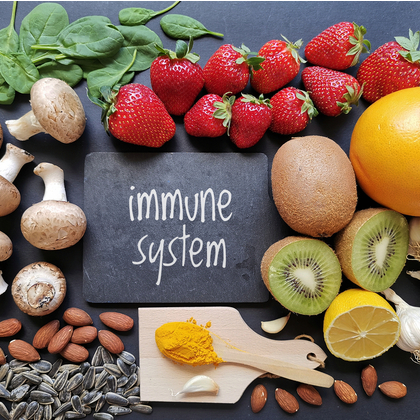
The human immune system is vital for health, protecting us against germs – viruses, bacteria and parasites – that can cause potentially life-threatening infections (these harmful germs are often called pathogens).
Many things can affect the efficiency of the immune system, including illnesses, medicines and lifestyle habits such as smoking. But the one thing most of us cannot avoid that can cause a gradual decline in immune function is getting older. It’s a bit like running or walking. After a certain point in life the older you get, the slower you tend to walk or run. The same goes for your immune system, which little by little slows down and fights off pathogens less effectively.
Immune development
When you’re born, your immunity comes from your innate immune system. This gives you general protection against some common pathogens in the form of antibodies that came from your mother when she was pregnant and during breastfeeding.
As you grow up you develop another type of immunity, called the adaptive immune system. This protects you against specific pathogens. Once you come into contact with a particular pathogen your immune system develops a memory of it. This means your immune system can recognise the pathogen and deal with it quickly if you encounter it again. It may also explain why adults get fewer colds than children, as they have been exposed to more cold viruses.
Age-related immune function decline is known as immunosenescence. However, this doesn’t mean older people have no immunity whatsoever. But it can mean that some have immune systems that don’t respond very well to some pathogens, particularly those their immune systems haven’t had to deal with before (novel pathogens). Getting older can affect your innate immunity too, which means your immune system may find it harder to fight off pathogens it’s encountered before – though your innate immunity is thought age better than your adaptive immunity (i).
Immunosenesence means your immune system may not respond as quickly when a pathogen enters your body as it used to. And once it realises the pathogen is there your immune system may take longer to deal with it. This can, for instance, mean you may have more frequent infections, more severe symptoms, and it may take longer for you to recover.
Immunity and vaccination
Meanwhile most of us acquire immunity to some common pathogens through vaccination. Most vaccines contain pathogens (or parts of pathogens) that have been treated to ‘imitate’ an infection in the body, helping the immune system to create antibodies that can help destroy the pathogen that caused it. The idea is that if you’ve had a particular vaccine and you come into contact with that pathogen again, your immune system can recognise it and deal with it quickly.
However, some vaccines – the flu vaccine, for instance – are thought to be less effective in older people (ii). The jury is still out about why this happens. For example, one team of researchers has suggested it has something to do with a certain type of antibody-producing cell, and the fact that they may become less effective with age (iii). Another study has found that younger people develop high levels of B cells four weeks after having a flu vaccine, but older people have high levels of other immune cells called monocytes, which trigger inflammatory responses in the body (iv).
Effects of ageing on immunity
There are several reasons why the immune system may become less robust as you get older, including the following:
Ageing and Covid-19 resistance
>While there is still much we don’t know about the coronavirus that causes the Covid-19 infection, one thing is clear – it hits older people much harder than younger people. According to the British Society for Immunology, 50 per cent of deaths from Covid-19 have happened in people aged 80 and older, and 40 per cent in those aged 60 - 79 (x).In general many of us are thought to have a healthy immune response to the virus (SARS-CoV-2). But this response varies from one person to another, and one of the factors that influences the strength of the response is age.
The British Society for Immunology says older people are more likely to suffer from inflammation and have less effective immune reactions to the virus (x). Older people are also more likely to get stuck in the early stage of an immune response, which generates a lot of inflammation and tissue damage. That can mean they don’t move on as quickly – or at all – to the second stage, which is when an infection is cleared away.
Older people are also more likely to have underlying conditions that raise the risk of severe Covid-19 symptoms and Covid-19-related death, including those that can depress the immune system such as diabetes and chronic liver and kidney disease.
Natural immune system support
Whatever your age, it’s always a good idea to make sure your overall health – which includes your immune system – is as strong as possible. Living a healthy lifestyle is essential for effective immunity, but you may also want to try taking a nutritional supplement to make sure you’re getting all the vitamins and minerals your body needs.
Your first step could be to try a good-quality multivitamin and mineral supplement, as this can be helpful during times when you’re not eating as healthily as usual. Look for a supplement that contains good levels of selenium, zinc as well as all the main vitamins.
You may also want to try one of the following:
Echinacea
A popular medicinal herb, echinacea is used to relieve the symptoms of the common cold and influenza-type infections, based on traditional use only. There is also some evidence that various forms and species of echinacea may reduce cold symptoms and help you get over a cold faster (xi). One study also suggests taking echinacea as a long-term preventative may reduce the number of colds you catch (xii).
Vitamin C
An essential nutrient that’s needed for many processes in the human body, vitamin C is believed to contribute to immune defence. It supports various functions of both the innate and adaptive immune system, with deficiency leading to impaired immunity and a higher susceptibility to infections (xiii). Studies suggest that vitamin C and zinc (see below) may make you more resistant to some infections such as the common cold, as well as shorten their duration (xiv).
Your body cannot make vitamin C, so it has to come from food and from vitamin supplementation. Many fruits and vegetables contain vitamin C, including berries, peppers, tomatoes, citrus fruit, kiwi fruit, broccoli and potatoes.
Vitamin D
Best known for maintaining bone health by helping the body absorb calcium, vitamin D is also thought to play a part in regulating innate and adaptive immunity, with deficiency associated with autoimmune issues as well as a greater susceptibility to infection (xv).
However, vitamin D deficiency is thought to be common in some countries including the UK, which is why the Scientific Advisory Committee on Nutrition advises that adults and children over the age of four should consider taking a daily supplement containing 10mcg of vitamin D throughout the year (xvi).
The recommended form of vitamin D is vitamin D3 or cholecalciferol, as it’s the natural form of vitamin D that the body makes when it’s exposed to sunlight. Vitamin D3 supplements are available in tablet form, and now you can get them in veggie-friendly drops too.
However, most vitamin D3 supplements are made from the fat of lamb’s wool, which means they’re unsuitable for vegans. The good news is that vegan vitamin D3 supplements sourced from lichen are now more widely available.
Elderberry
Elderberries – which grow on the Sambucus tree – have a long traditional use for the relief of colds and flu. One study investigating the effect of an elderberry extract found it reduced flu symptoms by three to four days, and that it might also be beneficial for the immune system by increasing the production of immune cells called cytokines (xvii).
Live bacteria
The millions of micro-organisms and bacteria that live in your digestive system are thought to play a key role in immune response, as well as your overall health and fitness. Indeed, experts believe around 80 per cent of immune tissue is found within the digestive tract (xviii).
Acidophilus and other types of live bacteria are thought to help boost the immune system and reduce the risk of viral infections, with some studies suggesting they may help prevent and relieve symptoms of colds and other infections (xix). One study also suggests taking certain types of live bacteria may shorten the length of a cold by almost two days as well as reduce the severity of symptoms (xx).
Food sources of live bacteria include yoghurt, kefir, sauerkraut, miso and tempeh, but nutritional supplements that contain live bacteria are also popular.
Zinc
An important mineral for human health, zinc is also considered essential for immunity. In fact, there’s strong evidence that zinc deficiency plays a major part in immune dysfunction in humans (xxi). One study of zinc deficiency in humans also suggests it may result in immune dysfunctions, mainly affecting T cells (xxii).
Foods rich in zinc include meat, shellfish, legumes, nuts, seeds, dairy foods, eggs and whole grains. However, many people may not be getting enough in their diet. If you’re thinking of trying a zinc supplement, look for the mineral in its citrate form, as this is believed to be absorbed by the body more easily than some other forms.
Beta glucans
Natural compounds called polysaccharides that are found in baker’s yeast, grains such as oats, barley, rye and wheat, as well as some mushrooms (shiitake, for instance) and seaweed, beta glucans (or β -glucans) are increasingly thought to be important for immune health.
While they may not be as well known as some other nutritional compounds, researchers have been interested in beta glucans since the 1960s. Several studies have shown that beta glucans have various effects on the human immune system, including protecting against infection and stimulating the immune system to respond to pathogens (xxiii).
Researchers have found that, among their various actions, they trigger and enhance the function of immune cells including macrophages, neutrophils, monocytes, natural killer cells and dendritic cells (xxiv). A review of studies into beta glucans has also concluded that they appear to be effective at enhancing immune function and reducing susceptibility to infection and cancer (xxv).
Beta glucans may even help reduce the symptoms of common cold infections, with experts investigating firefighters finding that those taking beta glucans had 23 per cent fewer colds than those taking a placebo (xxvi).
Find out more about what the immune system is and how it works. There’s also lots more information on a wide range of health topics in our pharmacy health library.
References:
-
Weiskopf, D., et al. The aging of the immune system. Transpl Int . (2009 Nov). ,22(11):1041-50. Available online: https://onlinelibrary.wiley.com/doi/full/10.1111/j.1432-2277.2009.00927.x
-
Sasaki, S., et al. Limited efficacy of inactivated influenza vaccine in elderly individuals is associated with decreased production of vaccine-specific antibodies. J Clin Invest. (2011 Aug). 121(8):3109-19. Available online: : https://www.jci.org/articles/view/57834
-
Henry, C., et al. Influenza Virus Vaccination Elicits Poorly Adapted B Cell Responses in Elderly Individuals. Cell Host Microbe . (2019 Mar 13). 25(3):357-366. Available online: https://www.cell.com/cell-host-microbe/fulltext/S1931-3128(19)30039-3
-
Nayaka, H.I., et al. Systems Analysis of Immunity to Influenza Vaccination across Multiple Years and in Diverse Populations Reveals Shared Molecular Signatures. Immunity. (2015 Dec). 15; 43(6): 1186–1198. Available online: https://www.ncbi.nlm.nih.gov/pmc/articles/PMC4859820
-
Griffin, A.V. Metabolic Damage and Premature Thymus Aging Caused by Stromal Catalase Deficiency. Cell Rep. (2015 Aug 18). ,12(7): 1071–1079. Available online: https://www.cell.com/cell-reports/fulltext/S2211-1247(15)00734-2?_returnURL=https%3A%2F%2Flinkinghub.elsevier.com%2Fretrieve%2Fpii%2FS2211124715007342%3Fshowall%3Dtrue
-
Fagnoni, F.F., et al. Shortage of Circulating Naive CD8(+) T Cells Provides New Insights on Immunodeficiency in Aging. Blood. (2000 May 1). ,95(9):2860-8. Available online: https://pubmed.ncbi.nlm.nih.gov/10779432
-
Vadasz, Z., et al. Age-related autoimmunity. BMC Med. (2013). ;11: 94. Available online: https://www.ncbi.nlm.nih.gov/pmc/articles/PMC3616810
-
Lloberas, J., et al. Effect of aging on macrophage function. Exp Gerontol. (2002 Dec). 37(12):1325-31. Available online: https://www.sciencedirect.com/science/article/abs/pii/S0531556502001250?via%3Dihub
-
Available online: https://www.msdmanuals.com/home/immune-disorders/biology-of-the-immune-system/effects-of-aging-on-the-immune-system
-
Available online: https://www.immunology.org/news/coronavirus-immunology-qa-what-you-need-know-about-our-new-report
-
Goel, V., et al. Efficacy of a standardized echinacea preparation (EchinilinTM) for the treatment of the common cold: a randomized, double-blind, placebo-controlled trial. J Clin Pharm Ther. (2004). ,29:75-84. Available online: https://onlinelibrary.wiley.com/doi/abs/10.1111/j.1365-2710.2003.00542.x Goel, V., et al. A proprietary extract from the echinacea plant (Echinacea purpurea) enhances systemic immune response during a common cold. Phytother Res. (2005 Sep 21). Available online: https://onlinelibrary.wiley.com/doi/abs/10.1002/ptr.1733
-
Ross, S.M. Echinacea Purpurea: A Proprietary Extract of Echinacea Purpurea Is Shown to Be Safe and Effective in the Prevention of the Common Cold. Holist Nurs Prac. (Jan-Feb 2016). ,30(1):54-7. Available online: https://journals.lww.com/hnpjournal/Citation/2016/01000/Echinacea_purpurea__A_Proprietary_Extract_of_.9.aspx
-
Carr, A.C., et al. Vitamin C and Immune Function. Nutrients. (2017 Nov). ,3;9(11). . Available online: https://www.ncbi.nlm.nih.gov/pmc/articles/PMC5707683
-
Wintergerst, E.S., et al. Immune-enhancing Role of Vitamin C and Zinc and Effect on Clinical Conditions. Ann Nutr Metab. (2006). ,50(2):85-94. Available online: https://www.karger.com/Article/Abstract/90495
-
Aranow, C. Vitamin D and the Immune System. J Investig Med. (2011 Aug). ,59(6): 881–886. Available online: https://jim.bmj.com/content/59/6/881.long Hewisom, M. Vitamin D and immune function: an overview. Proc Nutr Soc. (2012 Feb). ,71(1):50-6. Available online: https://www.ncbi.nlm.nih.gov/pubmed/21849106 Prieti, B. Vitamin D and Immune Function. Nutrients. (2013). ,5(7), 2502-2521. Available online: https://www.mdpi.com/2072-6643/5/7/2502/htm
-
SACN. Vitamin D and Health. (2016). Available online: https://assets.publishing.service.gov.uk/government/uploads/system/uploads/attachment_data/file/537616/SACN_Vitamin_D_and_Health_report.pdf
-
Barak, V., et al. The effect of Sambucol, a black elderberry-based, natural product, on the production of human cytokines: I. Inflammatory cytokines: I. Eur Cytokine Netw. (2001 Apr-Jun). ,12(2):290-6. Available online: https://pubmed.ncbi.nlm.nih.gov/11399518 Barak, V., et al. The Effect of Herbal Remedies on the Production of Human Inflammatory and Anti-Inflammatory Cytokines. Isr Med Assoc J. (2002 Nov). ,4(11 Suppl):919-22. Available online: https://pubmed.ncbi.nlm.nih.gov/12455180
-
Available online: https://patient.info/news-and-features/how-to-boost-your-immune-system
-
Kang, E.J., et al. The effect of probiotics on prevention of common cold: a meta-analysis of randomized controlled trial studies. Korean J Fam Med. (2013 Jan). 34(1):2-10. Available online: https://www.ncbi.nlm.nih.gov/pmc/articles/PMC3560336
Rerksuppaphol. S., et al. Randomized controlled trial of probiotics to reduce common cold in schoolchildren. P2012 Oct. (2013 Jan). 54(5):682-7. Available online: https://onlinelibrary.wiley.com/doi/abs/10.1111/j.1442-200X.2012.03647.x Keyer. G.J., et al. Probiotic Effects on Cold and Influenza-Like Symptom Incidence and Duration in Children. Pediatrics. (2009 Aug). 124(2):e172-9. Available online: https://pediatrics.aappublications.org/content/124/2/e172 -
de Vrese, M., et al. Effect of Lactobacillus Gasseri PA 16/8, Bifidobacterium Longum SP 07/3, B. Bifidum MF 20/5 on Common Cold Episodes: A Double Blind, Randomized, Controlled Trial. Clin Nutr. (2005 Aug). 24(4):481-91. Available online: https://www.clinicalnutritionjournal.com/article/S0261-5614(05)00027-0/fulltext
-
Keen, C.L., et al. Zinc deficiency and immune function. Annu Rev Nutr. (1990). ,10:415-31. Available online: https://www.ncbi.nlm.nih.gov/pmc/articles/PMC2277319
-
Prasad, A.S. Zinc in Human Health: Effect of Zinc on Immune Cells. Mol Med. (2008 May-Jun). ,114(5-6): 353–357. Available online: https://www.ncbi.nlm.nih.gov/pmc/articles/PMC2277319
-
Novak, M., et al. β-Glucans, History, and the Present: Immunomodulatory Aspects and Mechanisms of Action. J Immunotoxicology Vol 5 issue . (2008). Available online: https://www.tandfonline.com/doi/full/10.1080/15476910802019045
-
Chan, G., et al. The Effects of Beta-Glucan on Human Immue and Cancer Cells. J Hematol Oncol. (2009 Jun 10). 2:25. Available online: https://jhoonline.biomedcentral.com/articles/10.1186/1756-8722-2-25 Akramiene, D., et al. Effects of Beta-Glucans on the Immune System. Medicina (Kaunas). (2007). ;43(8):597-606. Available online: https://pubmed.ncbi.nlm.nih.gov/17895634
-
Murphy, E.A., et al. Immune Modulating Effects of β -glucan. Curr Opin Clin Nutr Metab Care. (2010 Nov). ,13(6):656-61. Available online: Available online: https://www.eurekalert.org/pub_releases/2008-05/sc-mcf052708.php
Related Posts
Disclaimer: The information presented by Nature's Best is for informational purposes only. It is based on scientific studies (human, animal, or in vitro), clinical experience, or traditional usage as cited in each article. The results reported may not necessarily occur in all individuals. Self-treatment is not recommended for life-threatening conditions that require medical treatment under a doctor's care. For many of the conditions discussed, treatment with prescription or over the counter medication is also available. Consult your doctor, practitioner, and/or pharmacist for any health problem and before using any supplements or before making any changes in prescribed medications.

Christine
Christine Morgan has been a freelance health and wellbeing journalist for almost 20 years, having written for numerous publications including the Daily Mirror, S Magazine, Top Sante, Healthy, Woman & Home, Zest, Allergy, Healthy Times and Pregnancy & Birth; she has also edited several titles such as Women’ Health, Shine’s Real Health & Beauty and All About Health.
View More



